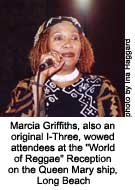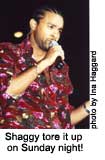The heart and soul of Jah music is Roots Rock Reggae. Characterized by bouncing bass lines, picking guitars, rimshot drumming and an afterbeat that corresponds with the handclap singing found in Jamaican churches, Roots music is synonymous with Reggae. Add mind bending/conscious lyrics representing the voice of Jamaica’s socially disenfranchised, with sprinkles of gospel, old Jamaican proverbs and the teachings of Rastafari and you have Roots music. Having its beginnings in the 1960s, Roots music was popularized by Bob Marley, Burning Spear, Culture, Mighty Diamonds, The Maytals, Israel Vibration and more.
Sunday at the Bob Marley Day Celebration in Long Beach was about the Roots, “Many of the Roots artists you see here today have worked extensively in Europe for the past 20 years,” said Long Beach MC Amlak Tafari, “California and the US has just been opening up, but I find that the strength of Roots here has been growing, growing, growing.” The gleeful reaction of the sold out audience on Sunday seemed to support Tafari’s statement.
Ras Michael
Among the first to perform was Ras Michael. Rasta elder, master drummer and co-founder of the new Rasta International Marcus Garvey Cultural Center in Los Angeles, Ras Michael and his sons and daughters of Negus have used his African influenced Nyahbinghi drum and chant music as gospel to spread the teachings of Rastafari. Chanting down the evils of Babylon since the 60s, working with producers Coxsone Dodd, Tommy Cowan, Lee Perry, Bob Marley, among others, Ras Michael has faithfully carried the torch.
It was only fitting that he would be honored with an award for his contributions, presented by Roger Steffens, on this holy and glorious day honoring The King of Reggae, Bob Marley. Although his performance was early in the day, to which he only said, “someone have to play early and someone have to play late,” he accepted the award to a very loud ovation. “It’s a great privilege to the powers of the most high Jah Rastafari for I’n’I to be here at this occasion of Bob Marley and to see the achievements that he has received in life. For right now Bob no dead, Bob is still alive. That man is a Rastaman, and Rastafari is all about love and life and living. Irie I. Love makes the world go round. And the world has a garden and all the people in it are its flowers and we all beautify the garden with all our different colors. We are dealing with life. Put down gun, do not shock yourself to anxiety, put down the gun and let’s live,” said Ras Michael.
For more on Ras Michael, check his latest album, “A Weh Dem A Go do Wid It,” which he produced and released on his Zion Disc Label.
Wailing Souls
 Winston “Pipe” Matthews and Lloyd “Bread” McDonald, better known as The Wailing Souls, rose up from the Trenchtown ghettos of Jamaica to achieve international fame with talent and inspirational dedication. No one looked as happy on stage as this smiling duo. They took the stage and played some of their many hits from “Black Out With It,” including “Jah Jah Give Us Life To Live,” “Shark Attack” and showcased their “Things & Times” rhythm that is currently burning up the dancehalls. They also performed selections from their current album “Equality,” which is their third Grammy nominated album.
Winston “Pipe” Matthews and Lloyd “Bread” McDonald, better known as The Wailing Souls, rose up from the Trenchtown ghettos of Jamaica to achieve international fame with talent and inspirational dedication. No one looked as happy on stage as this smiling duo. They took the stage and played some of their many hits from “Black Out With It,” including “Jah Jah Give Us Life To Live,” “Shark Attack” and showcased their “Things & Times” rhythm that is currently burning up the dancehalls. They also performed selections from their current album “Equality,” which is their third Grammy nominated album.
Culture
Culture’s three-part harmony is the embodiment of Roots music. With original members Joseph Hill, Albert Walker and Kenneth Paley, Culture dominated and became an international success. Going solo as Culture, Joseph Hill with two backing singers continues to sprout a socio-political message of justice, delivered with a harmony that is cemented by Hill’s familiar vocals and their poetic verses.
Toots & The Maytals
Toots Hibbert’s music career spans every form of Reggae music from ska through contemporary Reggae, from 1962 to 2001, but he can’t forget the Roots. “Roots music is real Reggae. We sing, and put words together that clarify, and that’s real Roots music, that’s Reggae,” says Toots “Mr. Reggae Got Soul” Hibbert.
Often called the James Brown of Reggae, Toots brings energy to the stage. His main influences were Otis Redding and Sam Cooke. Toots and his fans scoff at critics who say his music isn’t real Reggae-he can’t help it if his Reggae’s got soul.
His hits are as boundless as his energy. Toots slid back and forth, dropped to his knees, baring his chest as he belted out hit after hit from his many albums including “Toots In Memphis,” “Spiritual Healing,” “Reggae Got Soul,” and more. My favorite was his classic single “54-46 That’s My Number.”
After the show, Toots unwound in the bar of the Hyatt Regency, almost apologetically expressing concern about his energy level. I was tired, not quite dead on my feet, casually noticing how he still refused to sit down or stop moving, as he moved about the room smiling, meeting and conversing with all newcomers.
The I-Threes
 Marcia Griffiths, Rita Marley and Judy Mowatt comprised Bob Marley’s backing band, the I-Threes, in his heyday. And to this day, they are all still singing.
Marcia Griffiths, Rita Marley and Judy Mowatt comprised Bob Marley’s backing band, the I-Threes, in his heyday. And to this day, they are all still singing.
About participating in the Bob Marley Day Festivities Marcia Griffiths said, “It’s always a special honor and privilege being a part of this celebration, because being a part of the original Bob Marley experience will always be special to me.”
 Considered one of the most successful female singers to come from Jamaica, in a notoriously male dominated business, Marcia has consistently put out hit after hit. “Electric Boogie” not only rocked Jamaica, it rocked Europe and the States. She presently has two new releases out that are doing extremely well.
Considered one of the most successful female singers to come from Jamaica, in a notoriously male dominated business, Marcia has consistently put out hit after hit. “Electric Boogie” not only rocked Jamaica, it rocked Europe and the States. She presently has two new releases out that are doing extremely well.
According to Judy Mowatt, “It has been about six years since I’ve been on this music scene and I had to be here this time and I’m so happy for the opportunity.”
Judy did songs from her classic “Black Woman” album, which was recorded at Bob Marley’s Tuff Gong studio in Kingston. At that time she was the first female Jamaican artist to produce her own album. She was brilliant as she sang some Bob Marley songs, and the songs she penned, “Many Are Called,” “Slave Queen,” and “Joseph.”
The crowd launched into an impromptu chant of “We Love You” after these first ladies of Reggae left the stage.
Kymani Marley
Roger Steffens opened, “So many of Bob Marley’s children have carried on his work: the marvelous Ziggy Marley, Steven, Sharon, Cedella and the Melody Makers, Damien, Julian Marley and there’s a new member on stage, especially to be with us tonight and I am so proud to welcome him and for him to participate for he represents the future.”
The first time I saw Kymani was in Long Beach several years ago. At that time he was shy, and awed by the whole experience. Not so in 2001.
Master bass player, Derrick Barnett, described how he came to play Bass in Kymani’s all-star band, “I got a call to come look at the artist,” said Derrick who is forever in demand, ” When I heard him, he was off the chain.”
After watching Derrick mash it up on stage, playing his bass like no one else in the business, I asked him about his unique style and the state of Roots music, “Roots music-that’s where it is. There needs to be a balance right now.” When dealing with Roots or dancehall he says it’s all the same to him, “Music comes first. I make sure the music is played correctly first. Some people can dance, but play incorrectly; some people play correctly but don’t dance. If you want to have the best of both worlds, practice before you do it on stage.”
Kymani was comfortable in his interviews, his confidence was apparent, his stage presence has truly developed and he put on a monster of a performance. “It’s wonderful. The vibe and the spirit here were high. It was an enjoyable feeling over all,” said a cool, calm and collected Kymani after his performance.
About his album “Journey,” he said, “It’s my first album, a stepping stone to identify myself-what line I want to travel. So far the album has been received well and the next album in July will be More Roots’.”
Shaggy
 A few of us struggled to stay awake the night before to watch Shaggy’s performance on Saturday Night Live. But add several thousand attentive hyped up fans and screaming females and there wasn’t a struggling eye in the whole venue. He smoked on “Oh Carolina,” “Angel,” “It Wasn’t Me,” and launched into a dancehall medley that left us wanting more.
A few of us struggled to stay awake the night before to watch Shaggy’s performance on Saturday Night Live. But add several thousand attentive hyped up fans and screaming females and there wasn’t a struggling eye in the whole venue. He smoked on “Oh Carolina,” “Angel,” “It Wasn’t Me,” and launched into a dancehall medley that left us wanting more.
Bunny Wailer
Bunny Wailer is the original and last living Wailer. Bob Marley and a young Neville Livingston were raised as brothers in Trenchtown after Neville’s father fell in love with Bob’s mother, Cedella Marley Booker. They soon began rehearsing in Joe Higgs’ studio and formed the Wailers, with Peter Tosh.
In his solo career Bunny Wailer has won three Grammy awards for best Reggae Album of the Year. His first solo performance outside of Jamaica was in Long Beach in 1986. Someone commented that a performance by Bunny Wailer was like going to school.
In flowing white robes and his Rastafari influenced headdress, he paid tribute to his fallen comrades by performing Bob’s and Peter’s songs. He also performed many of his own songs off of his socially conscious albums “Liberation,” “Struggle,” “Protest,” and “Blackheart Man.”
It has been said, “No matter what anyone says, Bunny Wailer shares with only a select few the title King of Reggae. Hopefully he and Peter Tosh will join Bob Marley in the Rock ‘N’ Roll Hall of Fame.”
Big Up The Roots…Everytime.





